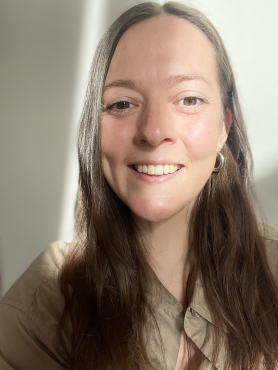You are here
- Home
- Elise Denis-Ramirez
Elise Denis-Ramirez
Professional biography
Background
Elise Denis-Ramirez is a Danish Chilean researcher with almost 10 years of experience in the third and private sector. Her specific expertise covers sexual and reproductive health, abortion rights, gender-based violence, mental health and youth-led approaches across research and activism. In her most recent role as Public Health Advisor with the Danish Institute Against Torture (DIGNITY), Elise worked on gender-based violence and interventions on mental health and psychosocial support (MHPSS). Her work included community studies (Lambert & Denis-Ramirez, 2022) (Denis-Ramirez, Rono & Anyango, 2023), training of civil society organisations in applied research, and monitoring and evaluation of clinical interventions. More on LinkedIn
Elise graduated with an MSc in Public Health from the University of Copenhagen, Department of Public Health. Her thesis included creative methods with children during the Ebola pandemic, and a chapter was published in the Children and Youth Services Review (Denis-Ramirez, Sorensen & Skovdal, 2017). She later earned an MA in Human Rights Law at SOAS, School of Law, University of London. At SOAS, she specialised in feminist legal theory, gender, and reproductive rights.
PhD research
Elise Denis-Ramirez’s co-production research explores perceptions and experiences of reproduction, sexuality, and abortion during adolescence in Chile. The PhD is grounded in feminist participatory action research, and she is working with young Chilean women (20-23 years) as Coresearchers in the project. Elise is guided by creative approaches and uses art-embodied methods within her research. The methods involve drawing, music, free writing and body-mapping through interactive creative workshops. Elise is committed to critically studying and engaging in feminist participatory research that is creative, gender transformative and intersectional.


.jpeg)
Visit the project on Instagram.
Impact and engagement
Elise is the Co-founder of the Sex, Research & Resistance podcast on Spotify hosted by the OU's Research Group on Reproduction, Sex and Sexual Health. Check out the episodes on:
Feminist Sexual and Reproductive Health and Rights Resistance - Experiences from Palestine and Sudan (Published June 2024)
Reproductive Justice - Creating a new reality through feminist knowledge building (Published June 2023)
Feminist Trailblazers' Podcast on Feminist Participatory Action Research
Season 9 episode 2 with Elise Denis-Ramirez, Amparo Gonzalez & Jana Vasil'eva - PhD Students Doing Feminist Participatory Action Research in Mexico and Chile: Insights for long term activism.
External collaborations
Her PhD research is a collaboration between the Open University, International Planned Parenthood Federation (IPPF) and IPPF Americas and the Caribbean Regional Office (ACRO). The project is also guided by academics in Chile at the Center for Human Rights at University Diego Portales and the Law Faculty at University Alberto Hurtado.
